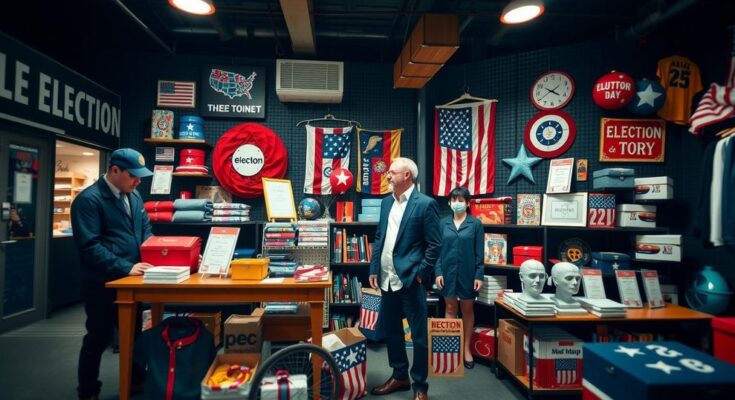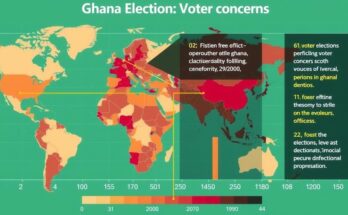The article discusses the surge of election merchandise made in China flooding the U.S. market, contributing to competitive challenges faced by local manufacturers. As presidential candidates’ products appear at vastly different price points, the discussion highlights the economic complexities surrounding the de minimis loophole. Prominent industry voices underscore the contradictions in American voters’ purchasing choices, questioning the political implications of supporting candidates while buying foreign-made goods.
As the presidential election in the United States approaches its climactic phase, an increasing number of voters are demonstrating their support for various candidates by donning election-themed merchandise. However, a considerable amount of this paraphernalia, ranging from the iconic “Make America Great Again” hats to “Childless Cat Lady for Harris” T-shirts, is likely to have been produced in China. E-commerce platforms have significantly facilitated the influx of inexpensive election merchandise from Chinese manufacturers into the American market, posing substantial challenges for domestic producers struggling to compete on price. Ben Waxman, the founder of American Roots, a U.S.-based apparel company, articulated this concern, stating, “I think the amount of stuff on Amazon and Etsy that’s coming from China and other countries in cargo ships and unloaded on American shores is drastically impacting American manufacturers’, like myself, ability to compete and grow our own business. I think it’s dramatic.” Waxman pointed out that his U.S.-made campaign T-shirts retail at approximately $15, contrasting sharply with similar items available on platforms like Temu, where they can be priced as low as $3. He emphasized the environmental and labor standards associated with his domestic operations, claiming that higher wages result in increased product costs. Despite efforts by U.S.-based manufacturers, there is an overwhelming presence of Chinese-made election goods available for purchase online, especially on sites like Temu and eBay. For instance, a Trump campaign “Make America Great Again” hat retails for nearly $40 on the official site, whereas an identical hat can be purchased on Temu for just around $4. Similarly, Kamala Harris hats are available for under $3 on Temu compared to the $47 charged on her official campaign site. This situation underscores the significant economic implications associated with the de minimis loophole, which enables Chinese companies to ship products valued under $800 to the U.S. without incurring import duties. Kim Glas, president of the National Council of Textile Organizations, lamented the adverse effects of this loophole, revealing that her organization has witnessed the loss of 21 manufacturing operations in the past 18 months, partly due to diminished sales of campaign merchandise. While the impact on the U.S. textile industry is apparent, it highlights a paradox in the ongoing political dialogue; voters supporting candidates who espouse anti-China trade sentiments may unintentionally be endorsing products from Chinese manufacturers. Mitch Cahn, president of Unionwear, a New York-based apparel company, remarked, “If someone is supporting a candidate because of that candidate’s economic policy… by buying a product that’s made in a country that stands for the opposite of that, they’re actually doing themselves and the candidate and the economy a disservice.” Furthermore, the accessibility and cost-effectiveness of imported Chinese goods offer consumers low-priced options, complicating the narrative surrounding domestic production. Chris Tang, a business administration professor at UCLA, noted that although manufacturing job losses occur, they also create avenues for small businesses to quickly import goods.
This article delves into the increasing trend of American voters showcasing their political allegiance through election merchandise, much of which is produced in China. The discussion reveals the economic ramifications of this trend for U.S. manufacturers who grapple with pricing and competition from low-cost Chinese goods. The de minimis loophole, which permits painless importation of cheaper goods, is central to the challenges faced by domestic producers. Furthermore, prominent figures from the textile sector articulate the irony and potential ramifications of voters purchasing foreign-made products while advocating for pro-American economic policies through their chosen political candidates.
In summary, the proliferation of Chinese-made election merchandise within the U.S. market represents a significant challenge for American manufacturers. This phenomenon raises critical questions about the implications of supporting candidates through products that may contradict the very economic principles they advocate. The ongoing dialogue regarding trade policies and domestic manufacturing viability remains paramount as consumers navigate their purchasing decisions amidst these broader economic concerns.
Original Source: www.voanews.com




